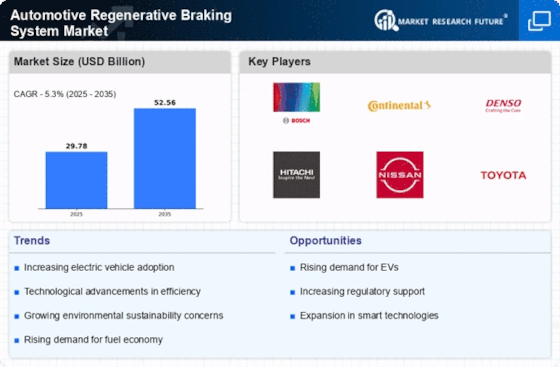Top Industry Leaders in the Automotive Regenerative Braking System Market
*Disclaimer: List of key companies in no particular order
The automotive regenerative braking system market is surging due to the ascent of hybrid and electric vehicles. In this high-energy domain, established leaders and nimble innovators engage in a fierce competition, each devising solutions that transform wasted braking energy into power-saving assets. Let's scrutinize the core strategies, pivotal factors, and burgeoning trends influencing this lively, eco-conscious contest.
Strategic Approaches of Key Players:
Product Diversification: Market leaders like Continental and Bosch are extending their scope beyond traditional hydraulic regenerative braking systems. They're introducing electronically controlled systems with heightened energy recovery efficiency and integrating them with advanced driver-assistance features such as adaptive cruise control to maximize energy conservation.
Technological Advancements: Innovation drives this sector. Start-ups like Echodyne Corporation disrupt the landscape with AI-powered energy management systems. These systems optimize regenerative braking based on driving conditions and road terrain, further enhancing fuel efficiency. This technological edge entices environmentally conscious consumers and early adopters.
Vertical Integration: Major players like ZF Friedrichshafen are delving into manufacturing critical braking system components like electric motors and power electronics to secure essential elements and manage costs. This vertical integration ensures quality and potentially allows for competitive pricing strategies.
Global Reach and Partnerships: With production expansion and evolving regulations, companies like Denso are establishing manufacturing facilities and regional partnerships. This localized approach ensures proximity to diverse markets and compliance with regional regulations.
Factors Influencing Market Share:
Energy Recovery Efficiency: A regenerative braking system's effectiveness hinges on its ability to convert a substantial portion of kinetic energy into usable electrical power. Players like Valeo stand out with their high-efficiency systems that boast over 90% energy recovery, providing significant fuel savings to automakers and drivers.
System Compactness and Cost-Effectiveness: While advanced features are desirable, cost remains a critical factor. Companies like NXP Semiconductors prioritize the development of compact and cost-efficient electronic control units and power electronics, making regenerative braking systems accessible across a wider range of car models and price segments.
Safety and Durability: Regenerative braking systems must integrate seamlessly with existing braking systems and operate reliably in diverse conditions. Magna International, for instance, focuses on robust designs and stringent quality control measures to ensure system safety and longevity, establishing trust with automakers and consumers.
Vehicle Integration and System Optimization: Coordinating regenerative braking with other vehicle systems like electric motors and batteries is crucial for optimal performance. Companies like Aptiv lead in system optimization, ensuring seamless energy flow and maximizing fuel efficiency across the entire vehicle platform.
Emerging Trends:
Wireless Charging Integration: Regenerative braking energy can potentially wirelessly charge electric vehicles while in motion. Start-ups like WiTricity pioneer this technology, offering extended driving range and convenience for EV owners.
Predictive Braking and Energy Harvesting: Integrating sensors and algorithms allows for anticipatory braking based on traffic conditions and the road ahead, maximizing energy recovery. Companies like Continental lead in this technology, further optimizing fuel efficiency and driver comfort.
Bi-directional Charging and V2G (Vehicle-to-Grid) Integration: Regenerative braking systems can potentially feed energy back into the grid during off-peak hours. Players like ABB explore V2G solutions, offering additional power sources and grid stabilization options.
Overall Competitive Scenario:
The automotive regenerative braking system market is a dynamic and exciting space propelled by environmental regulations, technological advancements, and the pursuit of sustainable mobility. Established players with broad product portfolios, technological leadership, and global reach hold an edge. However, the emergence of new technologies, materials, and integration possibilities constantly reshapes the landscape. Players who can swiftly adapt, innovate, develop cost-effective and efficient solutions tailored to specific applications, and contribute to sustainability and energy optimization will secure the lead position in this electrifying race.
Recent Industry Developments:
ZF Friedrichshafen AG (Germany): Announced a partnership with REE Automotive to develop integrated e-drive and braking systems for electric and hybrid vehicles.
Denso Corporation (Japan): Showcased its latest high-precision electric brake actuator technology at the Automotive Engineering Exposition in Yokohama.
Delphi Automotive PLC (US): Acquired Australian brake technology company, Brembo Australia, to bolster its regenerative braking systems portfolio.
Continental AG (Germany): Partnered with REE Automotive to develop and produce integrated electric axles with regenerative braking functionality.
Mazda Motor (Japan): Introduced its e-SKYACTIV G e-Hybrid system, featuring a new regenerative braking strategy for improved fuel efficiency.
Leading Companies in the Automotive Regenerative Braking System Industry:
- ZF Friedrichshafen AG (Germany)
- Denso Corporation (Japan)
- Delphi Automotive PLC (US)
- Continental AG (Germany)
- Mazda Motor (Japan)
- Hyundai Mobis (South Korea)
- Robert Bosch GMBH (Germany)
- ADVICS North America, Inc. (US)
- Faurecia SA (France)
- TRW Automotive (US)
- Autoliv Nissin Brake Systems Co., Ltd. (Japan)
- And others.











